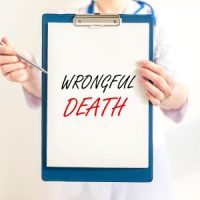What Are The Most Common Causes Of Wrongful Death Claims?

Those who have lost loved ones know only too well how difficult the grieving process can be. However, when a death is the result of someone else’s carelessness, that sense of loss can be even more intense. Our legal team specializes in these types of cases, known as wrongful death claims, which help the family members of the victim recover compensation for the medical bills and other losses that were the result of their loved one’s death. The causes of wrongful death claims are wide ranging, but some types of accidents do tend to be more dangerous than others. To learn more about the most common type of wrongful death claims, please reach out to our experienced Fort Lauderdale wrongful death lawyers today.
What is a Wrongful Death?
In Florida, when someone passes away because of another person’s wrongful act, negligence, default, or breach of contract, his or her surviving family members may be able to file a wrongful death claim on the victim’s behalf. However, only certain individuals can file this type of legal claim, including the deceased’s:
- Parents;
- Spouse;
- Children; or
- Dependent relatives.
Under Florida law, plaintiffs only have two years from the date of their loved one’s death to file a wrongful death claim.
Pedestrian and Bicycle Accidents
Pedestrian and bicycle accidents are notorious for causing devastating injuries to non-motorists. Tragically, these injuries often prove fatal, leaving the victim’s family members to contend with hefty medical bills and other expenses while they grieve. When these kinds of accidents are the result of a driver’s negligence, the victim’s surviving family members could be entitled to wrongful death damages.
Medical Malpractice
Even highly skilled and expertly trained medical professionals make mistakes. Unlike other professions, these mistakes can be deadly for patients, who may suffer fatal injuries as a result of misdiagnosis, a medication error, or a failure to follow proper protocols. If a person passes away because of this kind of medical negligence, surviving family members may have grounds for a wrongful death claim.
Car Accidents
Many of us use vehicles on a day-to-day basis, so it can be easy to forget what a dangerous activity driving actually is. The reality is that car accidents result in thousands of deaths for motorists in Florida every year. When these crashes can be linked to someone else’s negligence, the victim’s family could be entitled to wrongful death damages.
Preventable Child Deaths
Some of the most difficult wrongful death claims we pursue are those that involve the death of a child. These fatalities can occur for a wide range of reasons, but certain activities tend to be particularly dangerous for children. According to the Florida Department of Health, for instance, drowning is the number one cause of death for children under the age of four years old. Sadly, these deaths are often the result of improper childcare, defective pool safety devices, or negligent property owners.
Wrongful Death Lawyer in Fort Lauderdale
Has your family experienced the loss of a loved one because of someone else’s negligence? Contact Boone & Davis at 954-566-9919 today to learn more about how our dedicated Florida wrongful death lawyers can help you hold that person accountable.
Resource:
leg.state.fl.us/Statutes/index.cfm?App_mode=Display_Statute&Search_String=&URL=0700-0799/0768/Sections/0768.19.html
